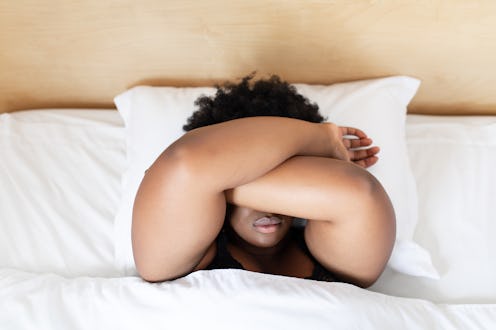Health
What Daylight Saving Time Ending Does To Your Brain
Prepare to feel out of it.

This Sunday, Americans' clocks will fall back an hour, and although you'll get a smidge more sleep that morning, it also means it'll start getting dark out earlier. Aside from feeling bummed out when you look outside at 5 p.m. and the sun's already set, Daylight Saving Time (DST) could be affecting your brain in some pretty nuanced ways.
If you've ever lived in a place that has long winters, you might be familiar with seasonal depression, though it can occur during spring and summer months too. People living with seasonal depression, otherwise known as Seasonal Affective Disorder (SAD), often experience depressive symptoms in relation to seasonal changes. And because DST ends in November when the weather gets colder and the days get shorter, the time change could compound those symptoms.
"While no specific cause of SAD is known, studies have found some specific factors that could contribute to SAD," Dr. Katy Kamkar, PhD, C.Psych, a clinical psychologist at the Centre for Addiction and Mental Health in Toronto, tells Bustle. "For instance, the reduced sunlight might affect our biological or internal clock (circadian rhythm) that plays a role in when we sleep and when we wake up."
Messing with your circadian rhythm can impact your mental health. "Reduced sunlight can also drop the level of serotonin, a neurotransmitter that affects our mood, in turn, leading to symptoms of depression," she explains. Switching back to standard time can have a negative effect on people who already have depression, according to a 2009 study published in the Environmental Health journal. The study suggested that a lack of exposure to sunlight in people with depression could lead to a higher likelihood of cognitive impairment, or a decreased ability to think critically and answer simple questions.
It's commonly believed that the time change in the spring is more severe than the time change in the fall, because in the spring, you lose an hour of sleep — but that's not necessarily true for all people. A 2008 study published in the BMC Physiology journal found that people who preferred morning activities had a harder time transitioning out of DST than into it. Even so, the study suggested that people's circadian rhythms were disturbed in both scenarios. This essentially means that whether you're gaining or losing an hour of sleep, you could still throw off your sleep cycle.
Although transitioning out of DST could impact your circadian rhythm and mental health, it's hard to avoid participating, considering 70 countries around the world observe it, according to National Geographic. You might not be able to opt out altogether, but that doesn't mean you can't take little steps to help yourself better adjust to the time change. The Cleveland Clinic suggests sticking with your usual schedule and practicing a nighttime ritual to help your body and brain adjust to the time change. This way, even if you can't ignore the event altogether, at least you'll feel better prepared to face the new, shifted day.
Studies Referenced:
Lahti, T. A., Leppämäki, S., Lönnqvist, J., & Partonen, T. (2008). Transitions into and out of daylight saving time compromise sleep and the rest-activity cycles. BMC physiology, 8(1), 3. https://bmcphysiol.biomedcentral.com/articles/10.1186/1472-6793-8-3#article-info
Kent, S. T., McClure, L. A., Crosson, W. L., Arnett, D. K., Wadley, V. G., & Sathiakumar, N. (2009, July 28). Effect of sunlight exposure on cognitive function among depressed and non-depressed participants: a REGARDS cross-sectional study. https://www.ncbi.nlm.nih.gov/pmc/articles/PMC2728098/
Experts:
Dr. Katy Kamkar, PhD, C.Psych, clinical psychologist at the Centre for Addiction and Mental Health, and assistant professor in the University of Toronto's Department of Psychiatry
This article was originally published on